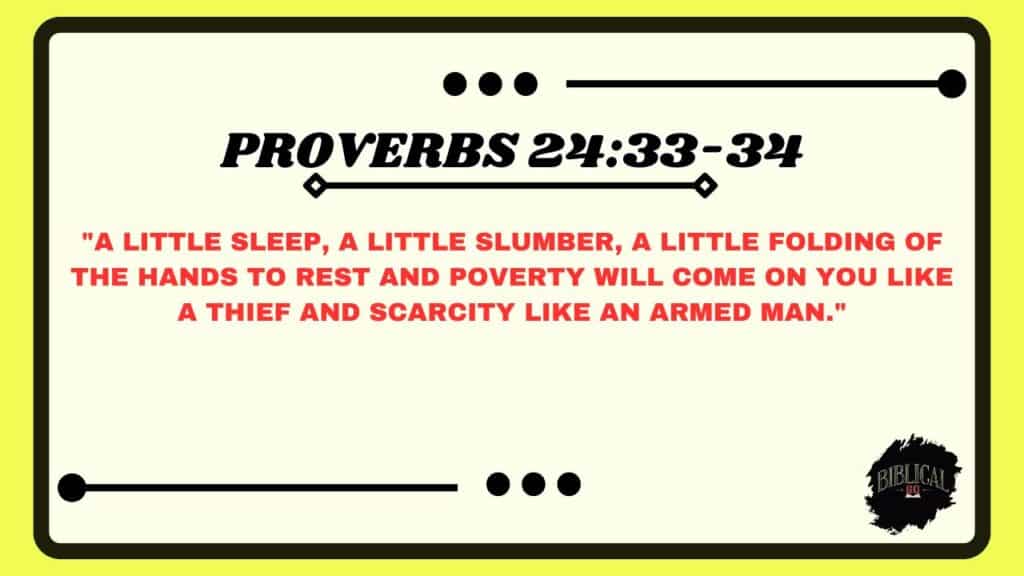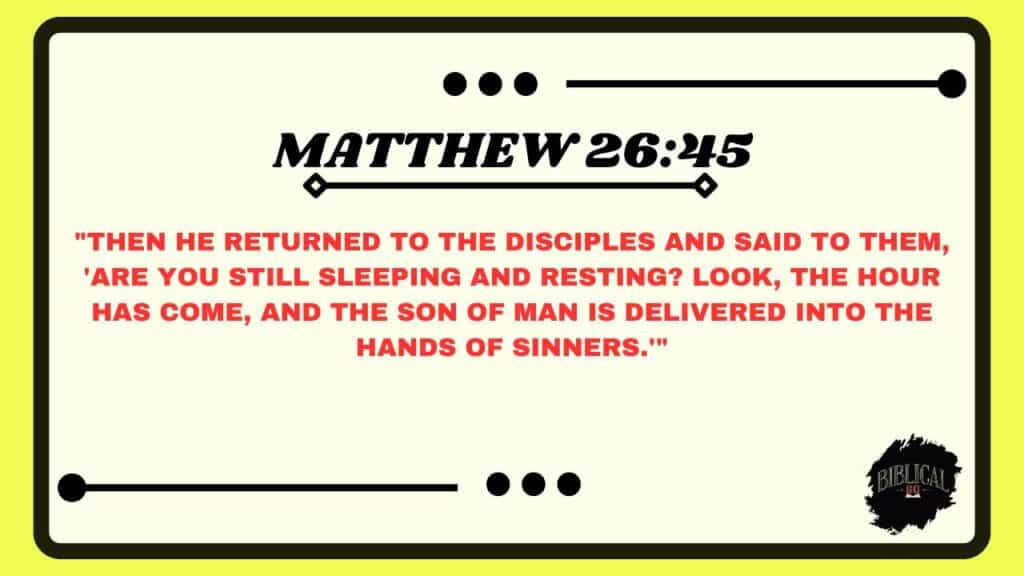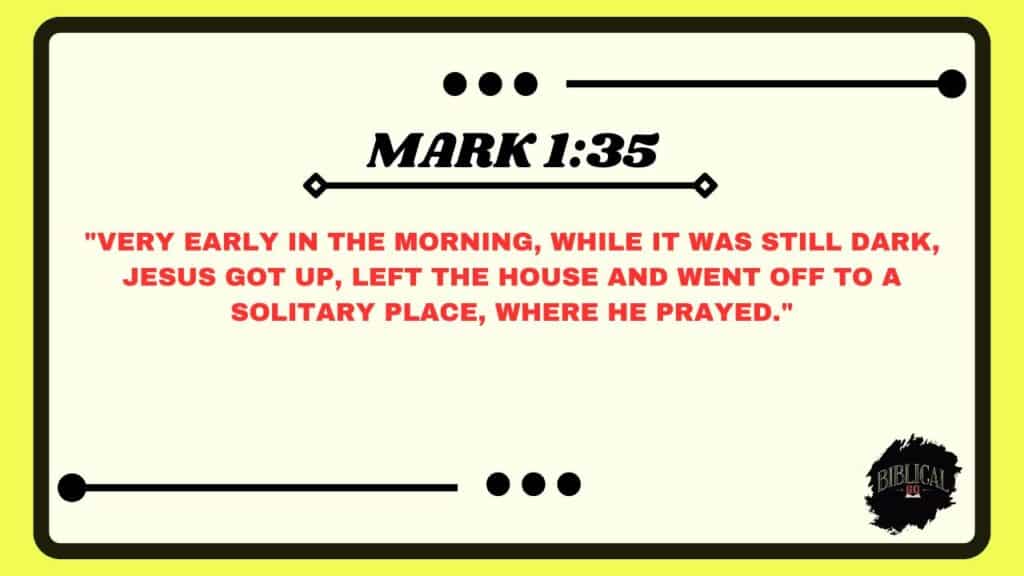Important Bible Verses About Sleeping Too Much: Sleep is a gift from God a necessary period of rest and rejuvenation for our bodies and minds. Scripture acknowledges the importance of rest, with Psalm 127:2 reminding us that God “gives sleep to those he loves.” However, the Bible also contains numerous warnings about excessive sleep and the spiritual dangers of laziness.
When we consistently oversleep, we may be missing out on God’s calling for our lives. The wisdom literature of the Bible, particularly Proverbs, offers pointed guidance about the balance between necessary rest and harmful overindulgence in sleep.
These 36 verses provide biblical insight into the spiritual implications of sleeping too much, helping us distinguish between restorative rest and slothful habits that can damage our relationship with God and others.
Also Read: 36 Bible Verses About Manifestation
The Danger of Excessive Sleep and Laziness
Proverbs 6:9-11
“How long will you lie there, you sluggard? When will you get up from your sleep? A little sleep, a little slumber, a little folding of the hands to rest and poverty will come on you like a thief and scarcity like an armed man.”
This direct warning from Proverbs connects excessive sleep with poverty and lack. The imagery suggests that while we sleep unnecessarily, our resources and opportunities are being stolen away. Consider setting an alarm and having a morning routine that helps you begin your day with purpose rather than lingering in bed.
Proverbs 19:15
“Laziness brings on deep sleep, and the shiftless go hungry.”
This verse shows the cyclical nature of laziness and oversleeping. Idleness leads to more sleep, which leads to greater need. Break this cycle by identifying one productive task to complete first thing each morning, creating momentum for your day.
Proverbs 20:13
“Do not love sleep or you will grow poor; stay awake and you will have food to spare.”
Solomon connects loving sleep with eventual poverty. The verse isn’t condemning necessary rest but rather the excessive prioritization of comfort over productivity. Evaluate whether you’re sleeping an appropriate amount or using sleep as an escape from responsibilities.
Proverbs 26:14
“As a door turns on its hinges, so a sluggard turns on his bed.”
This vivid metaphor compares the lazy person to a door swinging back and forth but going nowhere. The image of repeatedly turning in bed without getting up illustrates wasted potential. If you struggle with this habit, consider placing your alarm across the room so you must physically get up to turn it off.
Proverbs 24:33-34
“A little sleep, a little slumber, a little folding of the hands to rest and poverty will come on you like a thief and scarcity like an armed man.”

Nearly identical to Proverbs 6:9-11, this repetition emphasizes the importance of the warning. The Bible rarely repeats itself verbatim, so this duplication signals special significance. Create a vision board of goals you want to accomplish to motivate yourself to use your time wisely rather than oversleeping.
Also Read: 37 Bible Verses About Thieves And Liars
The Call to Wakefulness and Vigilance
Romans 13:11
“And do this, understanding the present time: The hour has already come for you to wake up from your slumber, because our salvation is nearer now than when we first believed.”
Paul uses sleep as a metaphor for spiritual laziness. He calls believers to wake up to spiritual realities and live accordingly. Set aside time each morning for prayer and Bible study before engaging with the demands of the day.
Ephesians 5:14
“This is why it is said: ‘Wake up, sleeper, rise from the dead, and Christ will shine on you.'”
Paul uses sleep as a metaphor for spiritual death, contrasting it with the light and life found in Christ. The call to “wake up” is a call to spiritual consciousness and engagement. Start your day by asking God to show you areas where you’ve been spiritually “asleep.”
1 Thessalonians 5:6
“So then, let us not be like others, who are asleep, but let us be awake and sober.”
This verse uses sleep to represent spiritual unawareness. Paul calls believers to vigilance and self-control as they await Christ’s return. Consider fasting from social media or television in the morning to maintain spiritual alertness.
Mark 13:36
“If he comes suddenly, do not let him find you sleeping.”
Jesus warns about being spiritually unprepared for his return. While physical sleep is necessary, this verse warns against spiritual complacency. Regularly evaluate your spiritual preparedness by asking if you would be ready to meet Christ today.
Proverbs 23:21
“For the drunkard and the glutton will come to poverty, and slumber will clothe them with rags.”
This verse groups oversleeping with other forms of overindulgence like drunkenness and gluttony. All three are presented as destructive habits that lead to poverty. Practice moderation in all areas of life, including sleep, food, and entertainment.
The Balance of Rest and Diligence
Ecclesiastes 5:12
“The sleep of a laborer is sweet, whether they eat little or much, but as for the rich, their abundance permits them no sleep.”

This verse provides balance by acknowledging the sweetness of deserved rest after honest work. It suggests that meaningful labor leads to better sleep. Focus on being productive during your waking hours so your rest feels earned and refreshing.
Psalm 127:2
“In vain you rise early and stay up late, toiling for food to eat for he grants sleep to those he loves.”
This verse reminds us that proper sleep is indeed a gift from God. The emphasis is on avoiding anxious striving rather than encouraging laziness. Recognize that both proper rest and diligent work are part of God’s design for your life.
Proverbs 3:24
“When you lie down, you will not be afraid; when you lie down, your sleep will be sweet.”
This promise of peaceful sleep comes in the context of wisdom and obedience to God. It suggests that righteous living leads to restful sleep. Examine whether your sleep habits are affected by a troubled conscience or spiritual disquiet.
Psalm 4:8
“In peace I will lie down and sleep, for you alone, LORD, make me dwell in safety.”
David expresses confidence in God’s protection, which allows him to sleep peacefully. This verse reminds us that trust in God leads to restful sleep. If anxiety keeps you awake or makes you oversleep, practice surrendering your worries to God before bed.
Matthew 26:45
“Then he returned to the disciples and said to them, ‘Are you still sleeping and resting? Look, the hour has come, and the Son of Man is delivered into the hands of sinners.'”

Jesus expresses disappointment when his disciples sleep during a critical spiritual moment. This reminds us that there are times when vigilance is more important than rest. Discern when God is calling you to wake up for important spiritual opportunities.
Also Read: 37 Bible Verses About Mothers And Daughters (Explained)
Warnings Against Spiritual Sleepiness
1 Corinthians 15:34
“Come back to your senses as you ought, and stop sinning; for there are some who are ignorant of God I say this to your shame.”
Paul uses the language of awakening to call believers back to righteousness. Spiritual sleep is equated with sin and ignorance of God. Regularly examine your life for areas where you may have grown spiritually numb or complacent.
Isaiah 56:10
“Israel’s watchmen are blind, they all lack knowledge; they are all mute dogs, they cannot bark; they lie around and dream, they love to sleep.”
Isaiah criticizes religious leaders who are spiritually asleep at their posts. This powerful metaphor reminds those in leadership of their responsibility to remain alert. If you’re in any position of spiritual influence, regularly evaluate whether you’re maintaining proper vigilance.
Jonah 1:5-6
“All the sailors were afraid and each cried out to his own god. And they threw the cargo into the sea to lighten the ship. But Jonah had gone below deck, where he lay down and fell into a deep sleep. The captain went to him and said, ‘How can you sleep? Get up and call on your god! Maybe he will take notice of us so that we will not perish.'”
Jonah’s sleep during a life-threatening storm represents his spiritual avoidance and disobedience. The pagan captain’s rebuke highlights the inappropriateness of sleep during crisis. Ask yourself if you’re using sleep to avoid dealing with important issues in your life.
Proverbs 10:5
“He who gathers crops in summer is a prudent son, but he who sleeps during harvest is a disgraceful son.”
This verse uses agricultural imagery to emphasize the importance of being awake and working during critical seasons of opportunity. Identify the “harvest seasons” in your life – times of opportunity that shouldn’t be wasted in unnecessary sleep.
Proverbs 12:11
“Those who work their land will have abundant food, but those who chase fantasies have no sense.”
While not explicitly mentioning sleep, this verse contrasts productive work with chasing fantasies – an activity that often includes daydreaming and idle time. Evaluate whether extra sleep is preventing you from engaging in productive work.
The Connection Between Character and Sleep Habits
Proverbs 6:6-8
“Go to the ant, you sluggard; consider its ways and be wise! It has no commander, no overseer or ruler, yet it stores its provisions in summer and gathers its food at harvest.”
Solomon points to the self-motivated industry of ants as an example for those tempted to laziness. Like the ant, we should work diligently without requiring constant supervision. Look to nature for examples of diligence and apply these lessons to your own life.
Proverbs 13:4
“A sluggard’s appetite is never filled, but the desires of the diligent are fully satisfied.”
This verse connects laziness with perpetual dissatisfaction. The diligent person, by contrast, achieves fulfillment. Consider whether persistent dissatisfaction in your life could be connected to sleep habits that prevent you from being fully engaged.
Proverbs 15:19
“The way of the sluggard is blocked with thorns, but the path of the upright is a highway.”
This metaphorical contrast shows how laziness creates its own obstacles, while righteousness leads to smooth progress. Excess sleep often creates complications in our lives that diligence would prevent. Make a list of the “thorns” that excessive sleep has created in your life.
Proverbs 26:16
“A sluggard is wiser in his own eyes than seven people who answer discreetly.”
This verse reveals the self-deception that often accompanies laziness. Those who sleep too much may justify their behavior with elaborate rationalizations. Be honest about whether you’ve been making excuses for oversleeping rather than addressing the habit.
Proverbs 22:13
“The sluggard says, ‘There is a lion outside!’ or, ‘I will be murdered in the streets!'”
This verse exposes the exaggerated excuses made by lazy people to avoid work and responsibility. Consider whether your reasons for extra sleep are legitimate or simply excuses to avoid responsibilities.
Also Read: 36 Bible Verses About Cheating Husbands (Explained)
Spiritual Consequences of Excessive Sleep
Proverbs 19:15
“Laziness brings on deep sleep, and the shiftless go hungry.”
Beyond the physical consequences, this verse suggests that laziness leads to a kind of spiritual stupor. The deeper we sink into lazy habits, the harder it becomes to break free. Create accountability with a friend who can check whether you’re rising at an appropriate time.
Proverbs 21:25
“The craving of a sluggard will be the death of him, because his hands refuse to work.”
This sobering verse connects lazy habits with potential destruction. When we refuse to work and instead indulge in excess sleep, we may be slowly destroying our potential. Reflect on the dreams and goals that excessive sleep might be preventing you from pursuing.
Romans 13:12-13
“The night is nearly over; the day is almost here. So let us put aside the deeds of darkness and put on the armor of light. Let us behave decently, as in the daytime, not in carousing and drunkenness, not in sexual immorality and debauchery, not in dissension and jealousy.”
Paul uses daylight as a metaphor for righteous living, contrasting it with nighttime behaviors. While not directly addressing sleep, it connects proper wakefulness with righteous living. Ask yourself whether excessive sleep is keeping you in spiritual darkness rather than engaging with God’s light.
John 11:11-14
“After he had said this, he went on to tell them, ‘Our friend Lazarus has fallen asleep; but I am going there to wake him up.’ His disciples replied, ‘Lord, if he sleeps, he will get better.’ Jesus had been speaking of his death, but his disciples thought he meant natural sleep. So then he told them plainly, ‘Lazarus is dead.'”
Jesus uses sleep as a metaphor for death, connecting physical sleep with spiritual death. This reminds us that while physical sleep is necessary, it can symbolize a deeper spiritual reality when excessive. Consider whether your sleep habits are more spiritually deadening than life-giving.
2 Timothy 2:26
“and that they will come to their senses and escape from the trap of the devil, who has taken them captive to do his will.”

Paul describes those who oppose the truth as being in a kind of spiritual sleep from which they need to awaken. This reminds us that excessive sleep can be a form of captivity. Ask God to show you if your sleep habits have become a trap that prevents spiritual vitality.
Also Read: 37 Important Bible Verses About Eagles (Explained)
The Call to Redeem the Time
Ephesians 5:15-16
“Be very careful, then, how you live not as unwise but as wise, making the most of every opportunity, because the days are evil.”
Paul urges believers to use their time wisely. Excessive sleep can waste precious opportunities for spiritual growth and service. Create a list of meaningful activities you could engage in during the time you currently spend oversleeping.
Colossians 4:5
“Be wise in the way you act toward outsiders; make the most of every opportunity.”
This verse emphasizes using time wisely, particularly in relation to sharing faith with non-believers. Consider whether excessive sleep is preventing you from engaging with people who need to hear about Christ.
Proverbs 31:15
“She gets up while it is still night; she provides food for her family and portions for her female servants.”
The virtuous woman described in Proverbs 31 rises early to care for her household. Her example challenges both men and women to consider whether early rising might enable greater service to others. Identify one way you could bless others by rising earlier.
Psalm 119:147
“I rise before dawn and cry for help; I have put my hope in your word.”
The psalmist describes rising before dawn to seek God through prayer and Scripture. This exemplifies prioritizing spiritual disciplines over extra sleep. Consider setting your alarm 15 minutes earlier to spend time in prayer before beginning your day.
Mark 1:35
“Very early in the morning, while it was still dark, Jesus got up, left the house and went off to a solitary place, where he prayed.”

Jesus himself modeled early rising for the purpose of prayer. If even the Son of God prioritized time with the Father over extra sleep, how much more should we? Follow Jesus’ example by establishing a morning prayer habit before the busyness of the day begins.
Also Read: 36 Important Bible Verses About Hunting (Explained)
Conclusion: Important Bible Verses About Sleeping Too Much
The Bible clearly distinguishes between necessary, restorative rest and the harmful habit of excessive sleep. Scripture consistently associates oversleeping with laziness, missed opportunities, and spiritual dullness, while connecting appropriate rest with God’s blessing and renewal.
As believers, we’re called to be good stewards of everything God has given us including our time. These 36 verses remind us that while sleep is essential for our well-being, we must be cautious not to let it become an idol that robs us of our productivity, purpose, and spiritual vitality.
God’s wisdom on sleep encourages us to find the proper balance: to enjoy rest as His gift while remaining alert to His calling on our lives. By being intentional about our sleep habits, we can honor God with both our rest and our wakefulness.
Practical Applications
- Create a consistent sleep schedule that allows for sufficient rest without excess
- Set an alarm across the room to prevent the temptation to oversleep
- Begin your day with prayer and Bible reading before checking electronic devices
- Find an accountability partner who can check on your rising habits
- Keep a journal to track how sleep affects your spiritual life and productivity
- Practice going to bed at a reasonable hour to ensure you’re not oversleeping due to exhaustion
- Identify and address underlying issues that might be causing you to use sleep as an escape
- Consider periods of fasting from sleep (with medical approval) for special seasons of prayer
- Post Scripture verses about diligence and wakefulness where you’ll see them first thing in the morning
- Remember that your sleep habits impact not only yourself but also your ability to serve others
Frequently Asked Questions
How much sleep is “too much” according to the Bible?
The Bible doesn’t specify an exact number of hours that constitutes “too much” sleep. Instead, it focuses on the pattern of laziness and the neglect of responsibilities. The appropriate amount of sleep varies by individual, but Scripture warns against loving sleep and using it to avoid our duties to God and others.
Does the Bible condemn napping or resting during the day?
No, the Bible doesn’t condemn appropriate rest or napping. Jesus himself rested (Mark 4:38) and invited his disciples to rest (Mark 6:31). The concern is with excessive or habitual sleep that becomes an escape from responsibility or spiritual engagement.
How can I tell if I’m sleeping too much out of laziness versus having a medical issue?
If you consistently need more than 9 hours of sleep despite adequate rest, or if you feel tired regardless of how much you sleep, consult a healthcare provider. Medical conditions like depression, sleep apnea, or thyroid disorders can cause excessive sleepiness. The Bible’s warnings about laziness assume that the person is physically capable of being more active.
What spiritual disciplines can help overcome patterns of oversleeping?
Regular prayer, Scripture reading, accountability with other believers, fasting, and service to others can all help overcome patterns of oversleeping. These practices increase spiritual awareness and provide motivation beyond personal comfort.
How do I balance the biblical call to diligence with the need for proper rest?
Scripture affirms both the value of work (Colossians 3:23) and the necessity of rest (Psalm 127:2). The key is ensuring that rest serves its proper function of restoration rather than becoming an escape or indulgence. Pay attention to your motivations and the fruit of your patterns.
Does early rising always indicate spiritual maturity?
While many spiritual exemplars in Scripture rose early (Jesus, David, the Proverbs 31 woman), the Bible doesn’t equate early rising itself with spiritual maturity. The focus is on using time wisely and being available to God. Some people may serve God effectively with different sleep schedules based on their circumstances and responsibilities.
Read more knowledgeable blogs on Biblical Go

Piper McMillan is a devoted writer and Bible enthusiast, offering insightful guides on Bible verses. Her blog provides practical interpretations and reflections, helping readers deepen their faith and understanding of Scripture through accessible and inspiring content.



